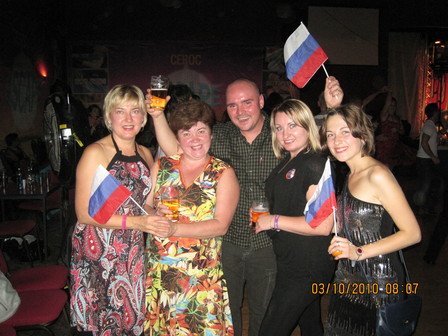Did you have a case where our compatriot identified you in some foreign store and immediately started talking to you in Russian? And it is our ability to define "our own" that is shocking. You haven't even opened your mouth! How did he identify you from the crowd? You are dressed very European and behave differently. We have a special gift and it does not concern clothes, burnt skin on vacation or the love of alcohol. No, there are other reasons and it is written wonderfully about them in the SNOB magazine.

Below you will find six main hypotheses of the "connectivity" of Russians and all post-Soviet people who see each other no matter what.
1. A post-Soviet person, when he is on vacation outside of the post-Soviet Union, least of all wants to meet compatriots. The logic is clear: there are plenty of them around the house. Well, if you have arrived somewhere, and there are all your own, it means that you have underestimated something, you have fallen for the common bait, you will not be able to brag properly on your return. At the sight of another Russian, almost every one of us instinctively makes a grimace: Well, I thought I was the only one so unique, experienced, inventive, strayed from the herd. Well, this grimace, of course, makes the recognition final.
2. Herding. In the century booking.com , TripAdvisor and we still buy tours from agencies. Not necessarily packaged, however "individual" — different travel agencies still send travelers to the same places, the owners of which have lured our agents and operators. It is extremely rare to meet travel business professionals who have enough imagination to come up with some unusual routes and establish the necessary connections for their retail sale - there is little business sense in this. As a result, "ours" in any place where travel agencies are sent is always enough to provide contrast with other travelers, recognition and associated discomfort (see paragraph 1).
3. The gait of a post-Soviet man. Perhaps its closest analogue is the pimp walk of an African—American from a disadvantaged area. Or the plastic wolf from "Well, wait!". Our man's legs demonstrate his self-confidence in every possible way. As he approaches, if he does not radiate danger (for this most of us lack muscle mass), then he sends a clear signal: don't put your finger in my mouth, don't even try to deceive me. Even a clerk, even, it's scary to say, a hipster tries to walk like that when he feels a threat coming from an alien external environment. I must say that the post-Soviet gait is not only instantly recognizable, but it seems to provoke all kinds of scams and street sellers of unnecessary things: these guys have seen everything in their lives and accept the challenge.
4. Photographic habits. In a Russian couple on vacation, a man is almost always responsible for the camera. He knows all her settings and flaunts this knowledge, first of all in front of a friend. Perhaps she also knows how to shoot, it is likely that she is better than her man, but she does not show it, but on the contrary, pretends to confuse the buttons — she is so brought up: you do not need to create complexes in a man, you will have to pay for it later. It is better to take flirtatious poses, pose as a mermaid, make cute faces, pull out lips — except for post-Soviet women, no one else does this. This behavior also dictates the popularity of services like Odnoklassniki. Photos like "I'm on the background of the Colosseum" or "I'm swimming in a waterfall" are a mandatory genre, part of our unique national culture. And yes, photos on the background of the hotel, which can be shown to relatives and colleagues, are also ours, so our semi—Asian nature speaks in us. At the same time, you will never confuse post-Soviet people with the Chinese, who also shoot like that.
5. Reckless. If someone jumped off a cliff in front of your eyes, which was forbidden to climb, this is our person. Actually, in one Asian national park I met a sign that read in English Do Not Climb the Rocks - and below, in Russian: "Do not jump off the rocks." Deep down, we despise not only the rules, but also the dangers, and our very life. In addition, we work so much and in such an acidic environment that we have already stopped noticing the everyday manifestations of this very recklessness in our own countries. You can see them abroad: we commit reckless acts routinely. And not only do we risk our lives or get drunk like pigs, but we also buy some extravagant items with the last money, so that later, after dragging them home or receiving a parcel in a couple of weeks, we look at the purchase in bewilderment: what's got me so hooked? Why would I do that?
6. Excessive mimicry. Who in a nightclub — of any orientation — best fits his dress code? Who avoids the main tourist route the most diligently, but meets in places whose "authenticity" is painted in the texts of experienced Russians easily found by Yandex? Who reads English books abroad, turning the pages too slowly for an American or an Englishman? Who, having chosen wine, tastes it according to all the rules, unwinding the glass and sniffing the bouquet for a long time? Our, of course, our man, infinitely native and reminiscent of James Bond from the joke: the parachute is dragged by a spy all over the Arbat.